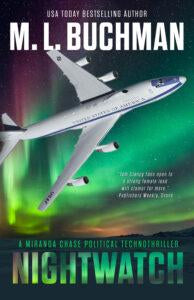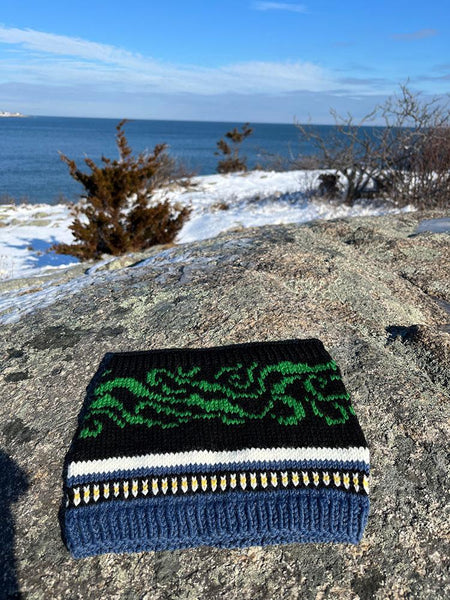
No Spoilers
(There are no spoilers for Miranda Chase #12 Nightwatch here even though I'm talking about an excerpt from the final scene...it's just really cool. And it's something my wife, with a Masters in Marine Botany, insisted that I include. Once I studied them, I had to agree.)
The Excerpt (yep, hours of research to write this little bit)
The guide had been a font of information from the moment the group had met in the lobby of Thule Air Base Top of the World Club. It was the social center for the six hundred people who worked at this northernmost US military base. Excerpt:
"See this poster on the wall. It’s actually a photo micrograph of Neodenticula seminae. It’s a species of plankton that hasn’t been seen in the Atlantic for eight hundred thousand years. Homo sapiens and Neanderthals both emerged less than three hundred years thousand ago. Because of the melting of the Northwest Passage, it has migrated over from the Pacific for the first time in all those years. This image is of a sample collected right here in the bay.
They had looked like curved stacks of golden glass blocks to make up a tube of warm color. Andi was glad that someone had made it safely through the Northwest Passage.
The Neodenticula seminae
It is one of my wife's favorite plankton. She said it looks like lovely glass blocks under the microscope. Here's an image from the 2010 research paper: "Morphological and phylogenetic comparisons of Neodenticula seminae (Bacillariophyta) populations between the subarctic Pacific and the Gulf of St. Lawrence" available at https://researchgate.net.

Neodenticula seminae from the Gulf of St. Lawrence, Northwest Atlantic, light microscopy. Fig. 1. Straight ribbon-shaped colonies. Fig. 2. Coiled ribbon-shaped colony. Fig. 3. Solitary and paired cells with chloroplasts.
The Cowl

The Neodenticula seminae are the little white and gold bars floating in the upper layer of the ocean in the Nightwatch Cowl. Then the floating ice on the horizon and the Aurora Borealis above. (My wife knit this as part of a drawing for anyone who purchased Nightwatch through my webstore in the first month it was available. Congrats to Nancy!)
The Perspective
I've always been fascinated by the ice, in case you couldn't tell (MC #11 Skibirdand my Antarctic Ice Fliers both in Antarctica, and now MC #12 Nightwatch in the Arctic). I botched an option to go to Antarctica as a college-student intern and it remains a deep regret. I still hope to get there someday. But like astronomy (I ran the college planetarium for 4 years) and airplanes, it has always fascinated me.
The opening of the Northwest Passage (from the northwest Atlantic over Canada and Alaska to the Bering Sea and on to the Pacific) and the Northeast Passage (from Europe over Scandinavia and Russia also to the Pacific) is having enormous impact on both trade relations and the environment. The shipping routes from China to the US East Coast via the Northwest Passage and to Europe over the Northeast Passage is already effecting global economics.
As a kid I read every account I could find about the early explorers from the deeply misguided Sir John Franklin to the utterly brilliant Sir Ernest Shackleton. The single most gripping account I ever found was Hell on Ice written by Read Admiral Edward Ellsberg, one of my favorite authors (thankfully back in print after years OOP).
Ten years ago I recall a pair of men set out to do a trek across the North Pole. They said it would probably be the last time it could ever be done from landfall to landfall because of ice melt. The next year, someone tried, but fell through the ice and died.
While looking for those articles, I stumbled on this one "The Untold Story of the Boldest Polar Expedition of Modern Times" (2020). They couldn't reach the ice at either end by land, so they did it by boat, in fall (Sept to Dec), which means they did their crossing in the dark!!! The last line particularly caught my eye: "Even if there were other explorers in this world willing to try, it’s unlikely ever to be repeated, due to the Arctic’s shrinking ice cap. Polar experts believe it's likely that within the next 20 years Septembers in the Arctic Ocean will be entirely devoid of ice, even at the North Pole. Says Gamme, “The great modern polar exploration era ended with that trip.”
Of course, plankton aren't the only critters now making the crossing: "Gray Whales Ocean Hopping from the N. Pacific to the N. Atlantic Ocean!" (2021)
I watch the ice caps shrink and I can only wonder at what incredible opportunities and tragedies await us. I'm hoping for mostly the former, of course.

